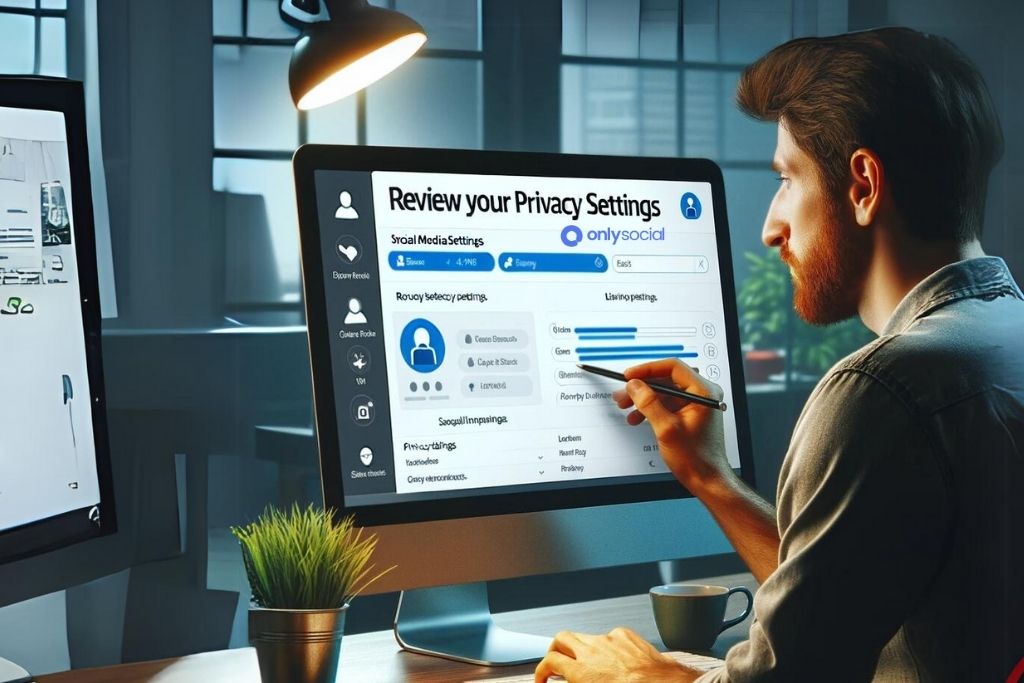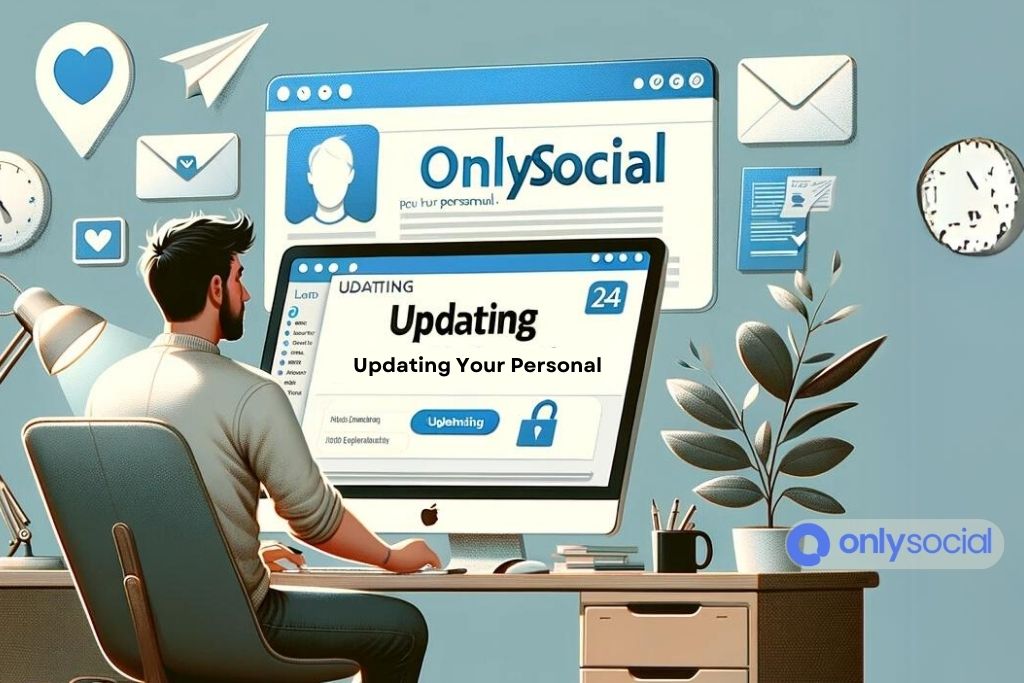Master Social Media Clean-Up: A Step-By-Step Guide to Refresh Your Profiles in 2025

Social media is more than just a casual pastime – it’s an extension of our persona, a digital representation of who we are. Given this significant impact, executing a regular Social Media Clean-Up is crucial to maintaining an accurate, positive online presence. This exercise is not just about deletions and privacy adjustments but acts as a comprehensive audit of your digital existence.
Table of Contents
- 1 Finding Your Social Media Accounts
- 2 Review Your Privacy Settings
- 3 Deleting or Archiving Inappropriate Content
- 4 Updating Your Personal and Professional Information
- 5 Unfollowing or Muting Unrelated Accounts
- 6 Building a Positive Online Presence
- 7 Maintaining a Clean Social Media Presence
- 8 BONUS
- 9 Frequently Asked Questions
- 9.1 How often should I conduct a Social Media Clean-Up?
- 9.2 How can I ensure my privacy on Social Media?
- 9.3 I have a public profile due to my profession. How can I maintain a positive online presence?
- 9.4 How important is my profile photo in my social media presence?
- 9.5 Can I retrieve content once deleted in the process of a Social Media Clean-Up?
- 9.6 Is unfollowing or muting an account on social media rude?
Why is Social Media Clean-Up Important?
In today’s digitalized world, every tweet, status update, or photo you share contributes to shaping your online reputation. Whether it’s a potential employer researching candidates or an old friend looking you up, the impression your social media profiles project can have solid real-world consequences.
The essential task of a Social Media Clean-Up is not merely tidying up. It involves analyzing the content you’re associated with, evaluating your audience, and revising your information to ensure it’s current and portrays the image you wish to convey.
A Sneak Peek into the Clean-Up Process
This guide is designed to be your companion in this journey toward a polished and professional online presence. From locating all your social media accounts to pruning outdated or inappropriate content, and from fine-tuning your privacy settings to actively shaping your online persona, we have got it all covered.
As we venture into the world of Social Media Clean-Up, remember, this is more than just a digital ‘spring cleaning’ — it’s about taking control of your online footprint, crafting your digital story, and being the architect of your social media identity. Let’s start this exciting journey towards a cleaner, more productive social media life!
Finding Your Social Media Accounts
The first step in your Social Media Clean-Up process begins with a comprehensive inventory of all your social media accounts. Over the course of our digital lives, it’s natural to accumulate multiple accounts on various platforms — a forgotten Myspace account here, an obscure blogging platform there. To begin your clean-up, it’s essential to locate each of these profiles and decide which ones to maintain and which to retire.
Identifying Active and Inactive Profiles
Start by listing all the platforms you have ever engaged with. These might include usual suspects like Facebook, Instagram, Twitter, and LinkedIn but also extend to platforms you may have experimented with in the past, like Reddit, Pinterest, or Tumblr. Each of these counts as a touchpoint in your digital reputation and should be included in your Social Media Clean-Up list.
Here’s an example table for keeping track of your profiles:
| Platform | Account Username | Active (Yes/No) |
|---|---|---|
| yourname_123 | Yes | |
| downtownswagger | No | |
| MySpace | coolkid2005 | No |
| mangogeek | Yes |
Prioritizing Accounts for Clean-Up
Now that you have your list, it’s time to prioritize. Start with the platforms you interact with the most: your active accounts. These impact your online image far more than dormant ones and are the ones most seen by your circle.
Next, consider the inactive or less frequently used accounts. Evaluate whether you should reinvigorate, maintain, or deactivate them based on current relevance in your life or career.
Remember, your goal in conducting a Social Media Clean-Up is to create a cohesive online identity, one that stands as a positive, compelling reflection of who you are in the digital sphere. Keep this in mind as you decide which platforms are the best places to showcase your personal and professional brands.
Review Your Privacy Settings
A key step in any Social Media Clean-Up is meticulous evaluation and adjustment of your privacy settings. This determines who sees your posts, personal information, photos, and more. A misstep here can lead to unwanted visibility, making it essential to spend time getting acquainted with the security and privacy settings each platform provides.
Understand the Levels of Access
Different platforms provide different levels of access. Some, like LinkedIn, are designed for public visibility, while others, like Facebook or Instagram, offer granular control over who sees what content. Start by reviewing the access levels in your social media accounts and ensure they align with your personal comfort and professional requirements.
Here’s a brief overview of the main types of accessibility:
- Public: Everyone can see your content, even those without an account on the platform.
- Private: Only confirmed connections can see your content.
- Partially Private: Everyone can see some parts of your content, but you can control access to other parts.
- Customized: You can control access to your content at an individual level.
Account Visibility and Post Access
These are two primary factors that you should consider. Account visibility includes your profile pic, bio, header image, and public posts. Keep these general enough to avoid revealing personal data to anyone who stumbles upon your profile.
Post Access, on the other hand, governs who sees the content you generate or share. Check each platform’s settings to ensure you’re comfortable with the groups that can view your posts.
Here’s an example of how to manage visibility settings:
| Platform | Account Visibility | Post Access |
|---|---|---|
| Public | Friends | |
| Public | Public | |
| Private | Followers | |
| Public | Connections, Public |
Connecting with the Right Audience
The final piece of the privacy puzzle is controlling who you connect with. This is just as crucial as your visibility settings. As part of your Social Media Clean-Up, review your connections and follower lists. Disconnect from, unfollow, or block any contacts that don’t align with your goals or contribute positively to your social media experience.
By refining your privacy settings, you ensure that your social media presence is visible to the right audience—in a way that aligns with your comfort and needs.
Deleting or Archiving Inappropriate Content
Another vital checkpoint on your Social Media Clean-Up journey is handling past content. As our lives change, so does the relevance and suitability of our historical posts. What may have been amusing or fitting a year (or ten!) ago, might not represent who you are today. Therefore, it’s necessary to comb through your posts and remove or archive anything that doesn’t currently match your digital persona or goals.
Assessing the Tone and Relevance of Past Posts
Begin by revisiting your past posts across different platforms. Look for content that features strong, controversial, or emotional opinions. Also, single out posts that have extensive personal details that you’d rather keep private. If you believe the material could be seen as unprofessional or disrespectful by others, delete or archive the content promptly. Remember, a Social Media Clean-Up is about maintaining a clear and progressive digital image.
Strategies for Managing Image and Video Content
Images and videos also play a critical role in shaping your online image. Visual content that is unrelated to your current interests, or that displays unprofessional behavior should be eliminated. Be mindful of not only the images you post but also the ones you’re tagged in. Consider untagging yourself or reaching out to the person who posted it if you feel the content is inappropriate.
Here’s an example of a simple checklist to keep track of your content clean-up efforts:
| Platform | Text Posts | Images/Videos |
|---|---|---|
| 10 deleted, 5 archived | 6 deleted, 3 untagged | |
| 17 deleted | 4 deleted | |
| 10 archived | 12 deleted, 6 archived | |
| Minor edits on 5 | None |
A rigorous Social Media Clean-Up process doesn’t just involve superficial changes. Your historical content is like a digital footprint that could make a lasting impression. Therefore, eliminating or archiving out-of-context or inappropriate material is crucial for protecting and enhancing your online reputation.
Updating Your Personal and Professional Information
An often overlooked, but hugely essential facet of a Social Media Clean-Up is updating your personal and professional information. This helps you maintain a credible, standing online presence. This information often includes your bio, profile picture, tagline, and other relative details.
Personal Information
Personal information, including your username, profile pictures, bio, or a few lines about you, needs to accurately represent your personality and current stage in life. Avoid sharing too much personal information publicly to protect your privacy. Remember, your personal information should be consistent across all platforms. This not only improves recognizability but also aids in aligning your online presence with your real-world persona.
Professional Information
Professional information, such as your job title, the company you work for, your educational background, professional achievements, and skills, need to be as accurate and up-to-date as possible, especially on platforms like LinkedIn. These details essentially create your online resume and directly impact your career prospects.
Updating Contact Information
Your contact information, particularly your email contact, should also be regularly updated. This not only improves your online safety but also ensures you don’t miss crucial notifications about your account activity.
Here’s how you might update your personal and professional information:
| Platform | Username | Profile Picture | Bio/Intro | Current Job | |
|---|---|---|---|---|---|
| Real Name | Recent Photo | New intro | Current Job | Update | |
| @Alias | Recent Photo | Short Bio | Occupation | Update | |
| @Alias | Recent Photo | Creative Bio | N/A | Update | |
| Real Name | Professional Photo | Professional intro | Current Job | Update |
By promptly updating your personal and professional information, you conserve an active and engaging online presence. It’s akin to meeting someone new – you would want your introduction to accurately depict who you are at present. Doing a Social Media Clean-Up puts forth the best, most updated version of you, allowing you to make an excellent digital first impression.
Keeping your follow list refined is just as crucial as curating your own profile in your Social Media Clean-Up strategy. Over time, there’s a pretty good chance you’ve followed or become friends with accounts that no longer align with your interests, values, or goals. By performing regular audits and unfollowing or muting accounts that no longer serve you, you’ll improve the quality of your feed, and in turn, your social media experience.
Start by perusing through your following or friend list on each platform. Highlight any outdated or irrelevant accounts, users who post too frequently about topics you aren’t interested in, or profiles that generate negative or unconstructive content.
Unfollow, Unfriend, or Mute
Depending on the platform and your relationship with the account, choose to unfollow, unfriend, or mute. Unfollowing or unfriending is a more definitive action and can help reduce clutter. On the other hand, muting allows you to stop seeing updates from certain accounts without officially breaking the connection – a more subtle approach.
Here’s an example of how this could be tracked:
| Platform | Accounts Reviewed | Unfollowed | Unfriended | Muted |
|---|---|---|---|---|
| 500 | 20 | 30 | 10 | |
| 600 | 100 | N/A | 80 | |
| 800 | 75 | N/A | 50 | |
| 400 | 25 | N/A | N/A |
Benefits of Refining Your Follow List
Whittling down your follow list has several benefits. It ensures you only interact with content that you find meaningful or enjoyable. This not only improves your overall experience but also helps maintain alignment with your personal or professional goals. In addition, limiting your exposure to irrelevant or potentially harmful content can significantly improve your digital well-being.
Your Social Media Clean-Up isn’t just about the messages you send – it’s also about the voices you choose to listen to. Prioritize quality over quantity to create a digital environment that reflects and supports your current interests, values, and aspirations.
Building a Positive Online Presence
The final step of your Social Media Clean-Up involves not just tidying up, but also proactively creating a positive online presence. Your social media profiles offer a unique opportunity to showcase your skills, passions, ideas, and personality to the world.
Begin by defining your areas of interest or expertise, and make an effort to regularly share content relevant to these topics. This helps portray a clear and focused online persona. Whether it’s industry articles on LinkedIn, personal photos on Instagram, or insightful comments on Twitter – ensure that each post contributes positively to your online image.
Engage Constructively
Engaging with others’ posts, including likes, comments, shares, or retweets, represents your digital ‘body language’. Avoid negative or offensive comments, stay polite and professional, and remain respectful of differences in opinion to maintain a positive online interaction.
Focus on Your Unique Value Proposition
Every individual has unique traits, experiences, skills, and perspectives – your ‘Unique Value Proposition’ (UVP). Your UVP is what separates you from your peers and makes your profile unique. This could be your creative skills, professional expertise, problem-solving ability, etc. Highlighting your UVP in your posts can draw the right kind of attention and build a positive online reputation.
Here’s an example of a simple plan to build a positive online presence:
| Platform | Quantity of Posts | Engage in Comments | Highlight UVP |
|---|---|---|---|
| 1 post per week | 3 times per week | Personal milestones | |
| 5 tweets per week | Daily | Industry trends | |
| 3 posts per week | 5 times per week | Creative projects | |
| 2 posts per week | 3 times per week | Professional achievements |
Remember, a successful Social Media Clean-Up does not end with removal, but rather with the careful digital planting and nurturing of an image that truly represents you. By consciously dispensing positive content and interactions, you can use your social media influence to create a powerful, uplifted personal brand.
Maintaining a Clean Social Media Presence
Congrats on completing your Social Media Clean-Up journey! To keep reaping the benefits of this endeavor, it’s essential to maintain a clean and positive social media presence. A well-organized follow-up routine can save time, reduce digital stress, and ensure you stay focused on your personal and professional goals.
Regularly Assess Your Content Quality
Schedule periodic evaluations of your existing content across all platforms. Look for content that may have lost relevance or no longer aligns with your personal or professional interests. For example, you could set calendar reminders to assess your content quality quarterly or bi-annually.
Stay Vigilant About Privacy Settings
Being keenly aware of privacy settings is crucial in managing your online presence. Regularly check your privacy settings to ensure that you are choosing the appropriate level of information sharing. As new platform updates can modify these settings, prompt oversight is crucial.
Keep Track of Your Online Connections
Remember that unfollowing, muting, or removing unrelated accounts should be an ongoing process. Routinely edit your friend and follow lists, so that your online connections remain updated and aligned with your current interests.
You could set up a schedule like this to maintain a clean social media presence:
| Task | Frequency | Platforms |
|---|---|---|
| Content Evaluation | Quarterly | Facebook, Twitter, Instagram, LinkedIn |
| Privacy Settings Review | Bi-annually | Facebook, Twitter, Instagram, LinkedIn |
| Manage Online Connections | Quarterly | Facebook, Twitter, Instagram, LinkedIn |
By consistently engaging in a Social Media Clean-Up, you cultivate a beneficial digital environment that supports your ongoing growth. Putting time and effort into maintaining a clean social media presence will ensure that you always put your best foot forward, enhance your personal brand, and maximize your online potential.
BONUS
Revitalize your social media presence with OnlySocial’s Post Planning and Scheduling feature! Seamlessly plan and schedule unlimited posts across all your social networks. With unlimited posting and the ability to manage countless social profiles, our tool empowers you to stay consistently connected. Don’t miss out on our commitment-free 7-day trial today.
Frequently Asked Questions
How often should I conduct a Social Media Clean-Up?
Depending on your social media usage, we recommend cleaning up your social media accounts semi-annually or quarterly. However, maintaining good practices, like regularly updating information or muting irrelevant content, should be done as needed.
How can I ensure my privacy on Social Media?
Each platform typically has stringent privacy settings that allow you to control who can see and interact with your content. We recommend periodically checking and updating these as per your requirements, especially posting any platform updates.
I have a public profile due to my profession. How can I maintain a positive online presence?
If your profile is public, it’s even more crucial to conduct a Social Media Clean-Up. Frequently update and fine-tune your profile information, carefully vet the content you share, engage positively with others, and maintain a regular presence by posting meaningful content.
Your profile photo is usually the first thing people notice, so it’s pretty significant. Ensure it’s a recent, clear picture of you (professional platforms should be more formal). Your picture should give a positive impression and be consistent across platforms.
Can I retrieve content once deleted in the process of a Social Media Clean-Up?
In most cases, once content is deleted, it can’t be retrieved. So before deleting any content, be sure it’s something you’re comfortable permanently removing.
Not at all. Your social media feed should serve you and align with your interests. Unfollowing, unfriending, or muting accounts helps curate a feed that reflects your current values, goals, and interests.



